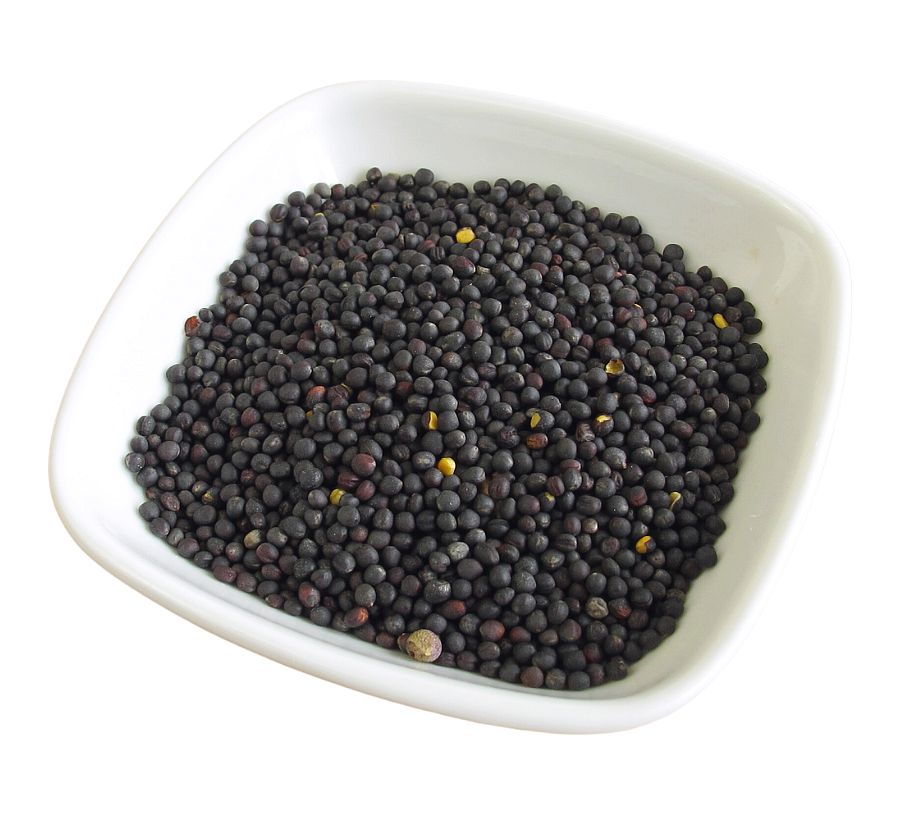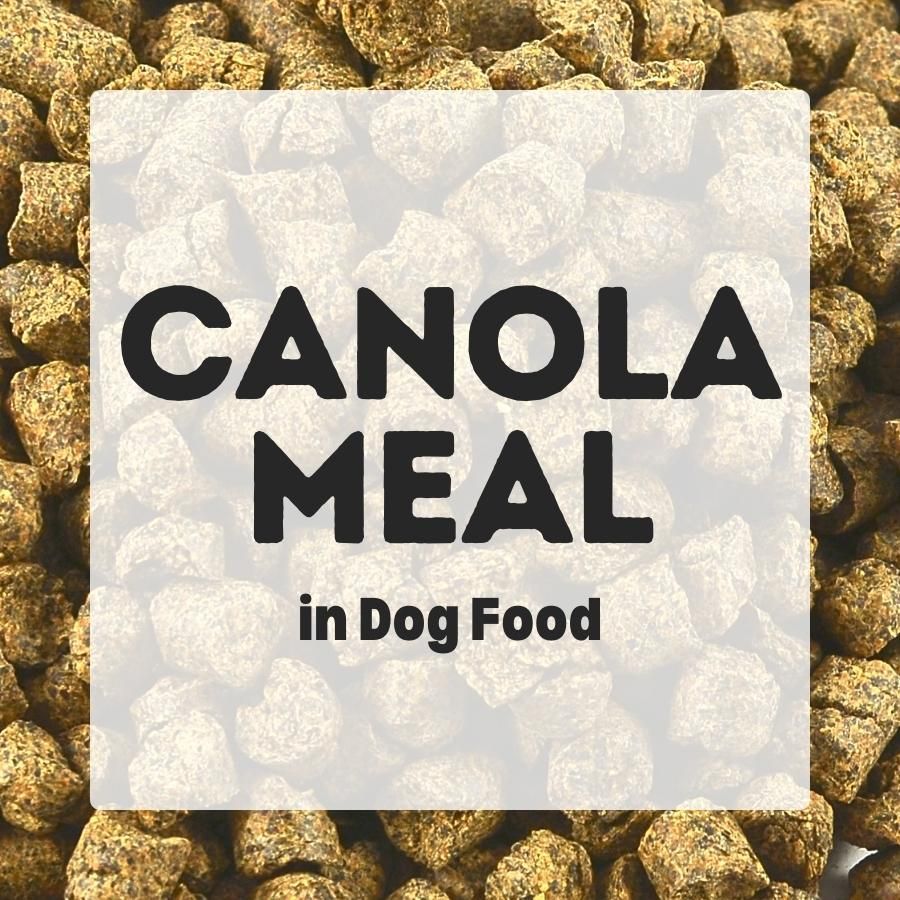Canola meal in dog food is a by-product of canola oil extraction. It is used as a source of plant protein and fiber.
Contents
About Canola Meal
Canola meal is the residue of the production of oil from rapeseed (Brassica napus, Brassica rapa, Brassica juncea, and their crosses).
Canola seeds are crushed to extract canola oil, and the remaining rapeseed press cake is processed into canola meal.

Canola meal processing begins with seed cleaning, rolling, flaking, and cooking. The seeds are then mechanically pressed and may be treated with hexane as a solvent to extract the oil. The remaining seed cake is flushed clear of solvents, toasted, and pelleted.
The oil can be extracted chemically or just by pressing. Solvent-extracted rapeseed meal is the main type commercially available.
In the past, rapeseed oil used to have a bad reputation.
This was because it contained erucic acid and glucosinolates and other anti-nutritional factors such as tannins and phytic acid.
Phytic acid can bind to certain minerals, such as zinc and iron, and prevent them from being absorbed properly. This can affect the balance of minerals in your dog’s diet and cause some issues.
Erucic acid is a fatty acid with a bitter taste. It is well absorbed from the gastrointestinal tract and distributed to all organs. Prolonged exposure can have adverse effects on cardiac health.
Little is known about the genotoxicity of erucic acid. All in all, it is nothing you would feed your dog daily on purpose.
Glucosinolates are a family of “natural pesticides” found in Brassicaceae plants such as mustard, watercress, and horseradish.
Their characteristic pungent aroma is produced because glucosinolates turn into mustard oils when the plant is chewed. They also cause the bitterness of cauliflower and Brussels sprouts.
Dogs don’t enjoy mustardy flavors. And some glucosinolates have been shown to possibly have toxic effects on the liver, kidneys, and thyroid glands.
However, by the 1970s, most of these anti-nutritional factors had been bred out of rapeseed cultivars, although not fully eliminated.
Edible rapeseed is branded as “canola”. Today, worldwide production of this oil seed is second only to soybean[3].
As more and more rapeseed was grown for oil production, more by-products became available which could be used as a protein source livestock feed.
An unfortunate fact is that most of the rapeseed cultivars grown in the US and Canada today are genetically modified to improve their oil quality or make them herbicide tolerant.
Canola Meal in Dog Foods
After varieties with low erucic acid and glucosinolate content were developed in the 1970s, it was found that canola meal could be useful as a dog food ingredient[5].
However, probably due to its different composition and nutritional value, it was never really established as a substitute for the more common soybean meal. So, fortunately, it is rare in dog food and still more commonly used in livestock feed[2,3].
Canola meals differ in their composition by cultivar and processing method. There are yearly variations due to growing conditions[6].

Exactly, what is canola meal in dog food?
The definition of “canola meal” to be used in pet food given by the AAFCO specifies what canola meal in animal food is[1]:
- It is obtained by solvent or mechanical extraction of canola oil of whole seeds from B. napus, B. rapa, B. juncea
- Canola meal is to be used as a source of protein
- It has to be low in erucic acid (<2%)
- It has to be low in glucosinolates (<30 µmol/g)
- It must contain a maximum of 12% crude fiber
Is Canola Meal Good For Dogs?
The nutritional value of canola meal can vary.
Solvent-extracted canola meal, for example, has way less oil residue than a mechanically extracted canola meal.
Canola meal obtained by mechanical pressure is higher in oleic acid while solvent-extracted canola meal is higher in linoleic acid.
Canola meal contains upwards of 35% crude protein with major storage proteins being napin and cruciferin.
Canola meal is often fed as a substitute for soybean meal. In comparison, it is lower in lysine but richer in sulfur-containing amino acids such as methionine than many other plant proteins[7].
Canola meal contains about 15% of carbohydrates in the form of starch, sugars, and up to 12% of fiber high in insoluble lignin[3,9].
A high fiber content and phytic acid, one of the anti-nutritional factors found in rapeseeds, could lower digestibility.
But luckily, the main anti-nutritional factors have been bred out of canola plants and the AAFCO regulates their maximum content.
Lastly, rapeseed meal provides some choline, niacin, riboflavin, and biotin as well as some calcium, selenium, and zinc.
In summary, canola meal is a protein ingredient and a by-product of the canola oil industry.
It provides some nutritional value, especially as a complementary source of sulfur-containing amino acids. However, it is usually used as a livestock feed, while its use in dog food is less well studied.
Further Reading
[1] AAFCO Official Publication. Chapter 6. Free Access.
[2] Pet Food Production and Ingredient Analysis (PDF). 2020. Institute for Feed Education and Research (IFEEDER), North American Renderers Association (NARA), Pet Food Institute (PFI)
[3] Feedipedia: Rapeseed meal. 2020.
[4] EFSA Panel on Contaminants in the Food Chain (CONTAM). Erucic acid in feed and food. EFSA Journal. 2016. https://doi.org/10.2903/j.efsa.2016.4593
[5] Brown et al. Utilization of Rapeseed Meal in Dog Rations. Journal of Animal Science. 1976. https://doi.org/10.2527/jas1976.4361225x
[6] Canola Council of Canada: Canola Meal Nutrient Composition.
[7] Wanasundara et al. Proteins From Canola/Rapeseed: Current Status. Sustainable Protein Sources. 2017. https://doi.org/10.1016/B978-0-12-802778-3.00018-4
[8] Bell. Factors affecting the nutritional value of canola meal: A review. Canadian Journal of Animal Science. 1993. https://doi.org/10.4141/cjas93-075
[9] Newkirk. Meal Nutrient Composition. Canola. 2011. https://doi.org/10.1016/B978-0-9818936-5-5.50012-7
